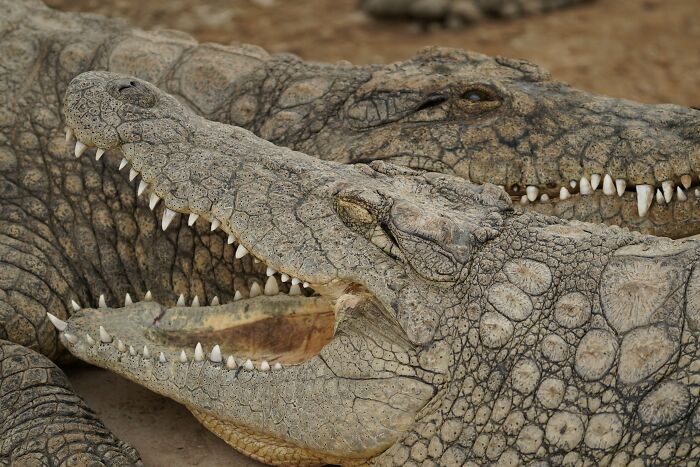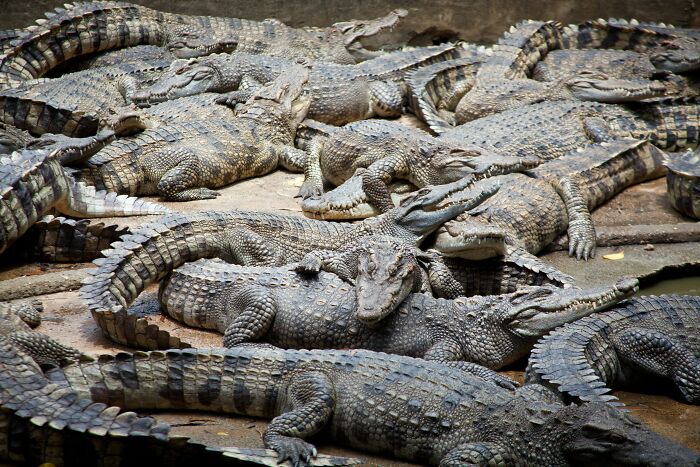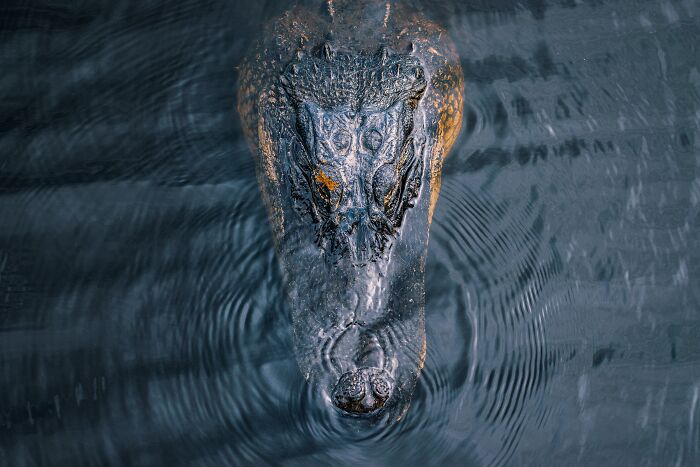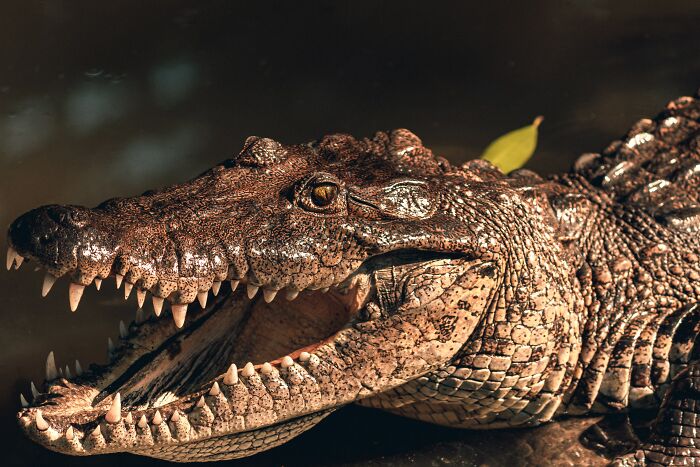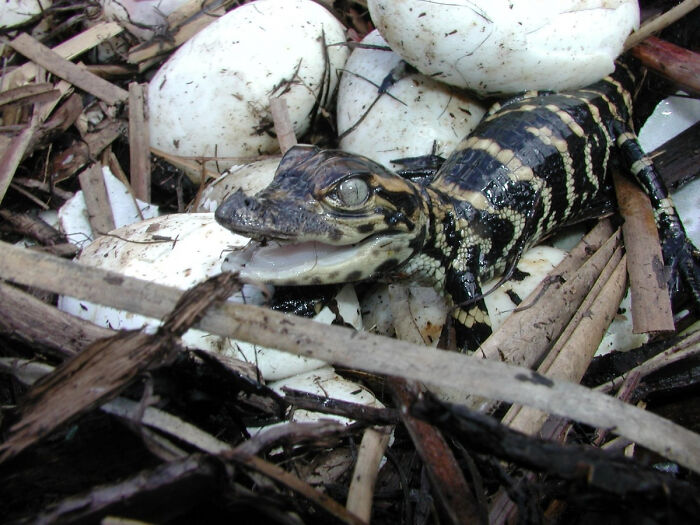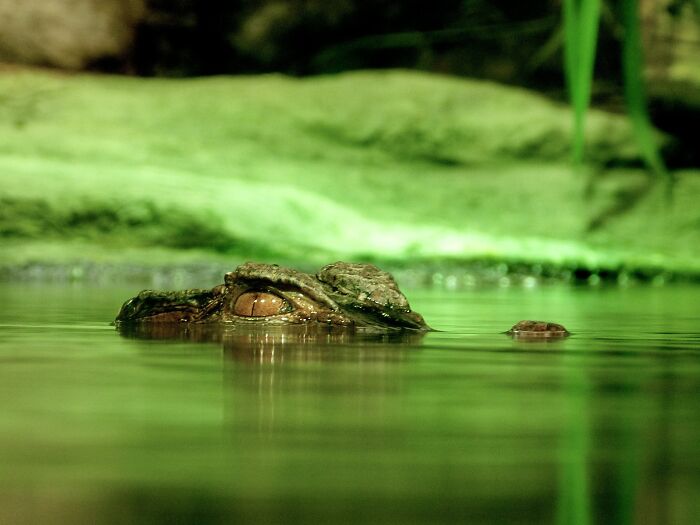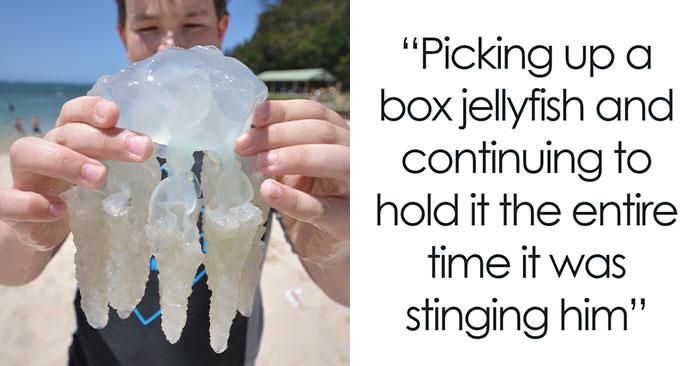Crocodiles might be dangerous predators, but they are also very interesting and unique animals. It seems like we know all there is to know about them, but is that really so? For example, you surely have heard that if you ever cross paths with a crocodile or an alligator you should run away in zig-zags. Well, wrong. Outrunning an adult crocodile is a difficult task, so don’t lose your breath on changing direction, rather put as many miles between you and the animal as possible. Better still, avoid crocodile habitats altogether, especially if not supervised by a ranger or other professionals. And where do crocodiles live? Naturally, near water bodies.
Of course, the main question when it comes to crocodiles is what is the difference between an alligator and a crocodile? Okay, that one’s easy. One will see you later and the other one after a while. And though these two are not different types of the same animal, there are 18 types of crocodiles that scientists currently recognize, with the saltwater crocodile being the largest and most aggressive of all.
Crocodiles don’t make good pets. Ever. No exceptions. Crocodiles don’t have emotions and affections; they have instincts. And if the instinct is to fill the belly, it will fill the belly — with you, its owner, if you happen to be the closest food option. I mean, have you seen a crocodile eating?
However, if you are interested in crocodiles and keep asking yourself questions like “Do crocodiles age?” and “Which crocodile set a size record?”, we have collected facts about crocodiles for you to read and learn new things about these fascinating, albeit dangerous creatures.
This post may include affiliate links.
Crocodiles have the most sophisticated heart in the animal kingdom, and actively change the destination of blood that flows through it depending on requirements.
Too bad it comes with tonic immobility when suddenly flipped on the back...
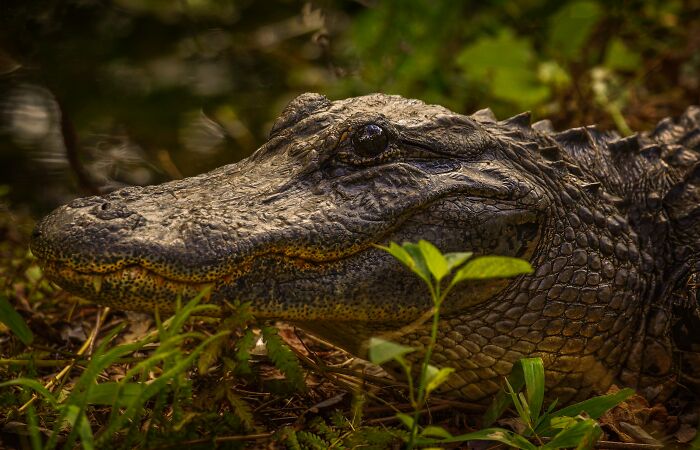 Crocodiles have very keen hearing. It is so good, in fact, that they can hear their babies calling from inside their eggs.
Crocodiles have very keen hearing. It is so good, in fact, that they can hear their babies calling from inside their eggs.
I can hear chicken and duck embryos un their eggs and they recognize my voice upon hatching.
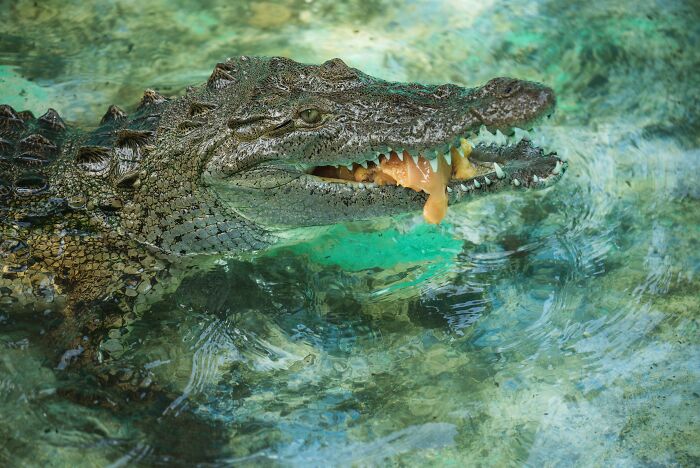 Crocodiles like having fun - playing with random objects (floating debris, noisy ceramics), surfing ocean waves or sliding down slopes.
Crocodiles like having fun - playing with random objects (floating debris, noisy ceramics), surfing ocean waves or sliding down slopes.
When a female crocodile lays eggs, the temperature of the nest where the eggs are laid actually determines the sex of the baby. If the temperature is less than 32 degrees Celsius, the baby crocodiles will be female and if it’s above that temperature, they will be male.
I remember when rock was young - me and Suzie had so much fun - holding hands and skimming stones - had an old gold Chevy and a place of my own - but the biggest kick I ever got was doing a thing called the Crocodile Rock.....
The expression to cry ‘crocodile tears’ (to display insincere or a false display of emotion), derives from crocodiles shedding tears, while they eat their prey.
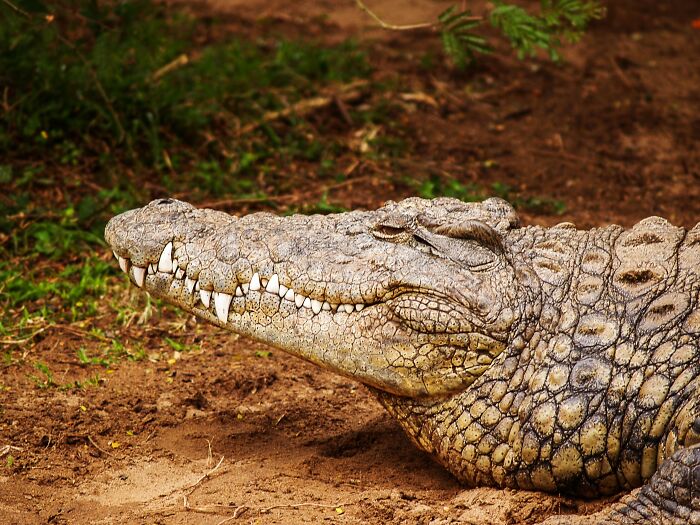 Crocodiles have a second tooth sitting in reserve underneath the external tooth, which can replace the lost tooth.
Crocodiles have a second tooth sitting in reserve underneath the external tooth, which can replace the lost tooth.
The longest crocodile captured alive measured 6.17 m (20.2 ft) and weighed at 1,075 kg (2,370 lb) in Agusan del Sur Province, Philippines.
Crocodile lifespans among species range from 25 to 70 years. Crocodiles in captivity have been known to reach 100 years old.
Worldwide, crocodiles are estimated to kill about 1,000 humans per year.
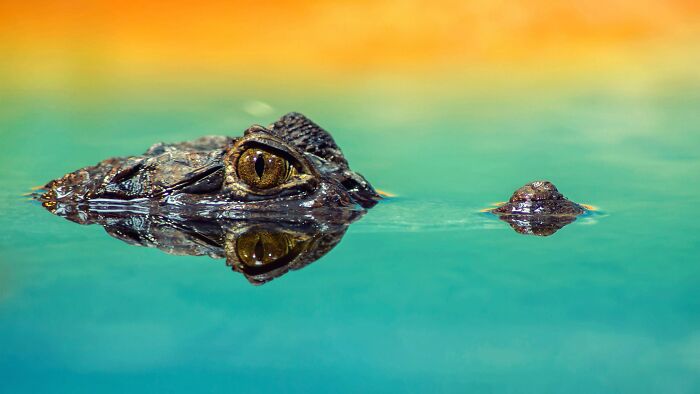 Crocodile eyes are protected with a third eyelid, while the eyeballs themselves can be drawn into the eye sockets during an attack.
Crocodile eyes are protected with a third eyelid, while the eyeballs themselves can be drawn into the eye sockets during an attack.
Crocodile eyes are located very closely together and they are oriented forward. This enables them to judge distance very accurately so they can determine the exact location of their prey prior to attack.
The diet amongst crocodiles differs greatly depending on whether they are confined or not.
An easy way to tell the difference between a crocodile and an alligator, is when a crocodile closes it’s mouth, all teeth are visible – as the upper and lower jaw are the same width.
Crocodiles swallow small stones to improve digestion. These stones help grind up the food in their stomachs.
Crocodiles have been known to occasionally cannibalize smaller crocodiles.
So do chickens and ducks. I have seen chickens feed chicks of the wrong color to the correctly colored chicks.
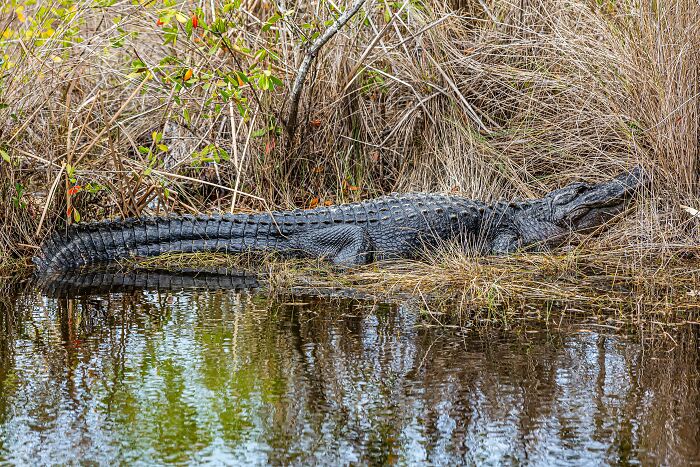 Crocodiles can sleep with one eye wide open.
Crocodiles can sleep with one eye wide open.
Crocodiles are carnivores, which generally means they eat only meat. However, a recent study proved they also enjoy an occasional taste of fruit.
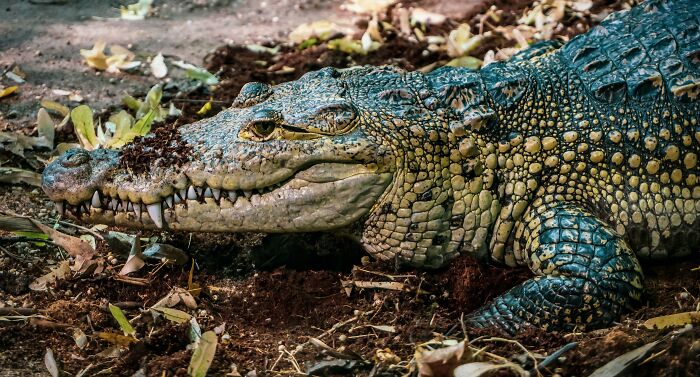 Crocodiles can be found in all inhabited continents with the exception of Europe and Antarctica.
Crocodiles can be found in all inhabited continents with the exception of Europe and Antarctica.
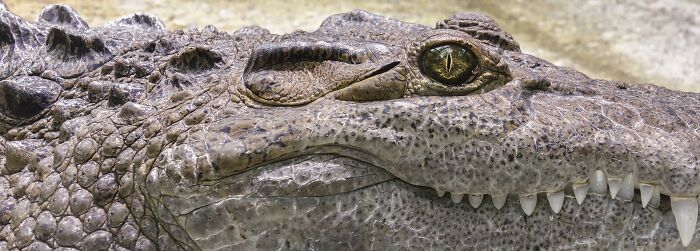 Black sports around alligator's mouth are sense organs that the it uses to detect changes in water pressure caused by the movement of potential prey.
Black sports around alligator's mouth are sense organs that the it uses to detect changes in water pressure caused by the movement of potential prey.
Crocodiles don’t sweat. To keep cool, they open their mouths which is known as “mouth gaping,” very similar to panting.
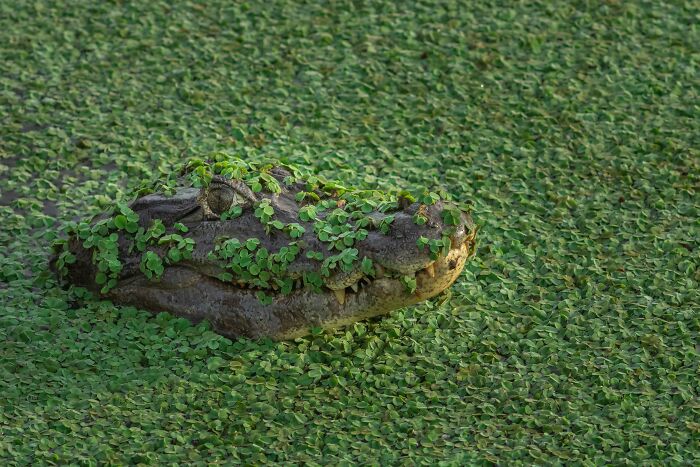 Crocodiles are quite a versatile reptile which means they can live in a variety of environments. Some of these may include lakes, rivers, freshwater bodies, salt water and brackish water (a combination of salt and freshwater).
Crocodiles are quite a versatile reptile which means they can live in a variety of environments. Some of these may include lakes, rivers, freshwater bodies, salt water and brackish water (a combination of salt and freshwater).
Alligators kill around one person in the United States every year, while crocodiles kill around 1,000 people in Africa alone every year.
Crocodiles have acute senses, an evolutionary advantage that makes them highly successful predators.
Crocodiles perform a ‘death roll’ to overcome prey, clamping on using their jaws, and spinning around powerfully.
Crocodiles ancestors (prehistoric crocodiles) were much bigger.
The ancient Egyptians and some tribes in New Guinea are just two of the cultures that honored the crocodile.
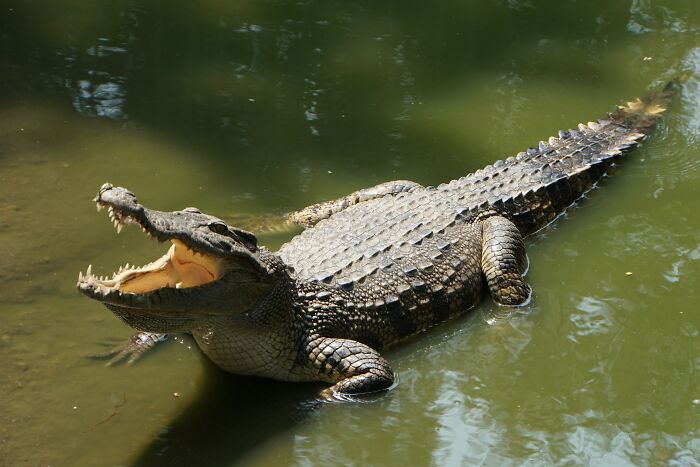 Crocodiles are extremely fast in the water, swimming up to speeds of 35 kilometers per hour (22 mph).
Crocodiles are extremely fast in the water, swimming up to speeds of 35 kilometers per hour (22 mph).
Crocodiles vocalize to communicate. The young of some species squeak and grunt, while adult crocs can growl, hiss or roar at each other.
Crocodiles wake up from hibernation when the weather starts to warm up and live their lives until it gets cold again.
These giant geniuses can use tools to fool prey, such as holding twigs with their snout to attract nest-building birds.
Crocodiles have relatively weak jaw opening muscles, which can be held shut with just a rubber band, or your bare hands.
The key difference to an alligator is snout shape. Alligators have wider, U-shaped snouts, while crocodiles are more pointed and V-shaped.
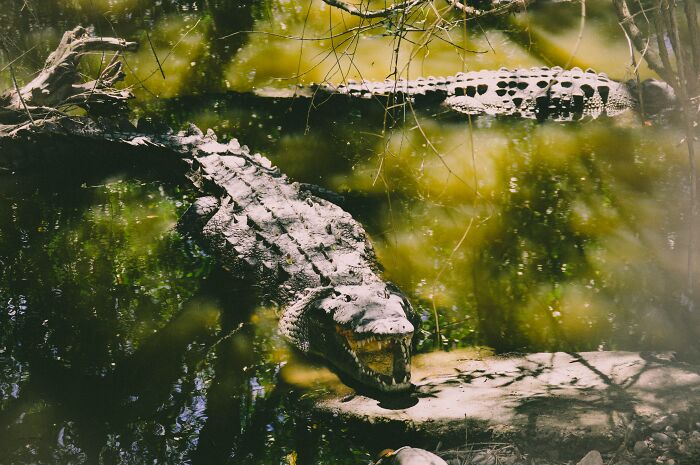 Crocodiles are ambush and opportunistic predators, capable of preying upon large mammals, such as smaller elephants, hippos, sharks or big cats.
Crocodiles are ambush and opportunistic predators, capable of preying upon large mammals, such as smaller elephants, hippos, sharks or big cats.
Crocodiles eat without chewing. Their jaw operates in such a way that it cannot move sideways, therefore they can’t grind down on food in a traditional chewing motion.
Saltwater crocodiles have the strongest bite - slammed their jaws shut with 3,700 pounds per square inch.
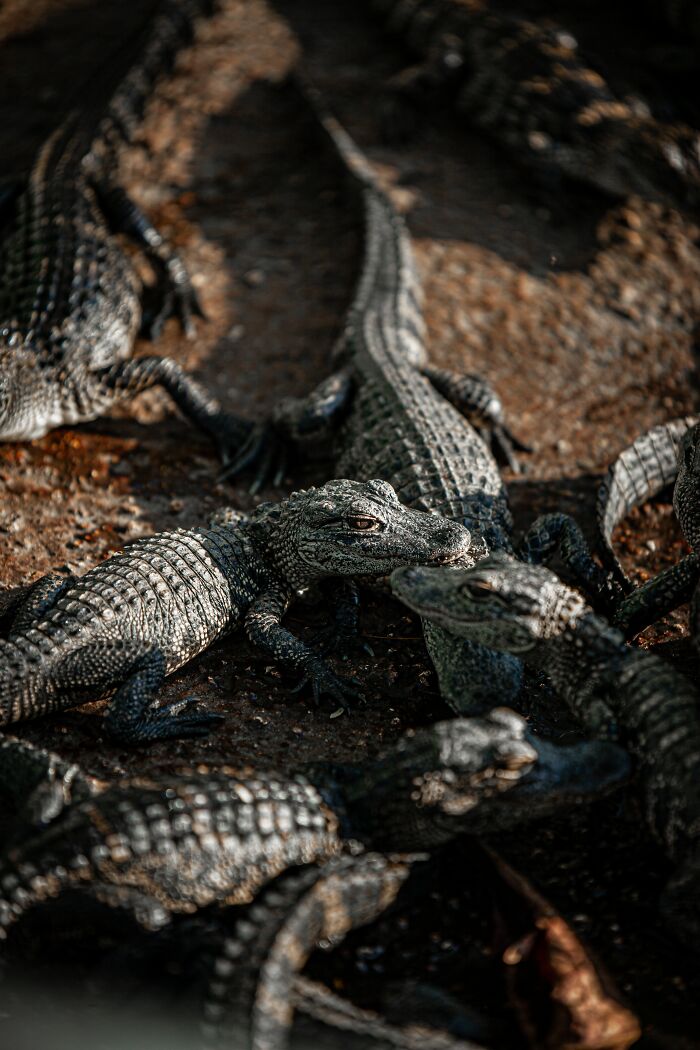 Most of the young crocodiles are eaten in their first year of life – by other predators like lizards, other crocodiles, hyenas, and even fish.
Most of the young crocodiles are eaten in their first year of life – by other predators like lizards, other crocodiles, hyenas, and even fish.
Crocodiles coexisted with dinosaurs.
The oldest crocodile was a freshwater crocodile named Mr. Freshie, who lived to be 140 years old.
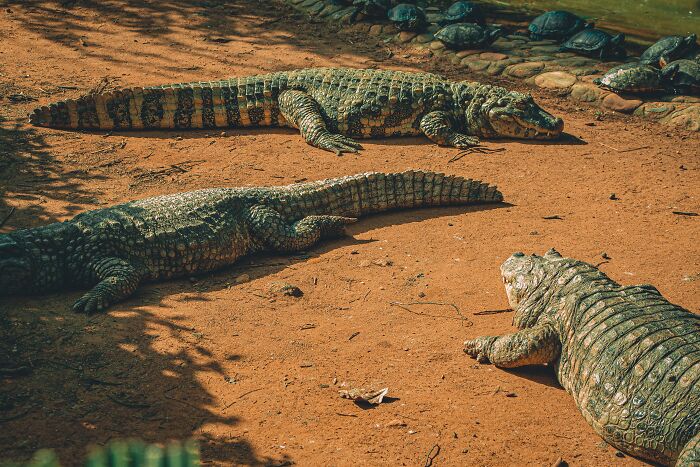 Crocodiles are aggressive by nature and are even more aggressive during mating season.
Crocodiles are aggressive by nature and are even more aggressive during mating season.
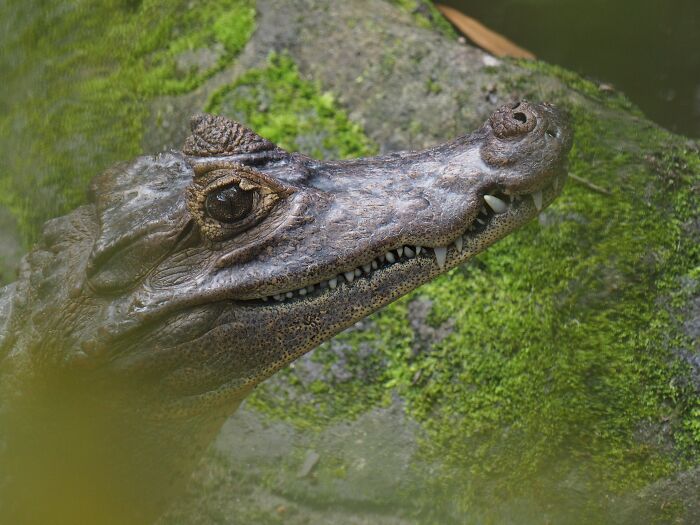 Every species has a unique combination of snout proportion, bony dorsal structures, and scale arrangement.
Every species has a unique combination of snout proportion, bony dorsal structures, and scale arrangement.
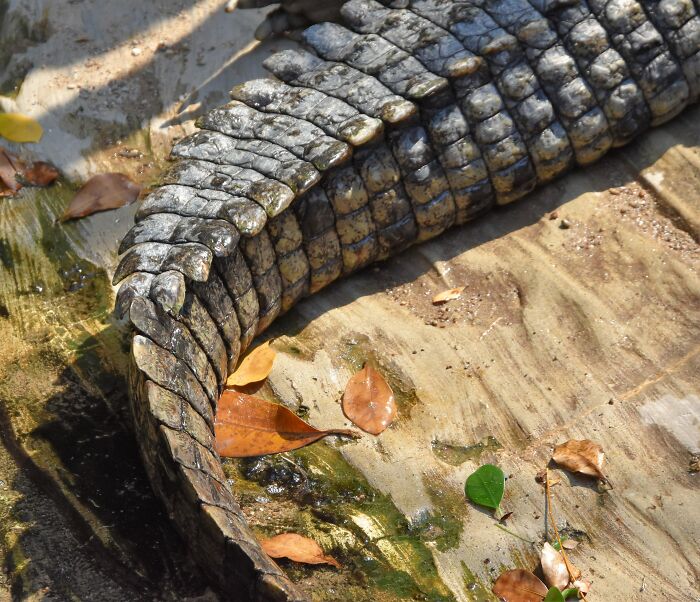 Male crocodiles may use their tails to gain attention and during attacks, they can flick their tail to knock out their targets.
Male crocodiles may use their tails to gain attention and during attacks, they can flick their tail to knock out their targets.
Crocodile's brain is capable of learning more than any other reptile in the animal kingdom.
 It’s a common myth that crocodiles can run fast on land. They can ‘belly run’ up to 17 kilometers per hour (11 mph) for short distances.
It’s a common myth that crocodiles can run fast on land. They can ‘belly run’ up to 17 kilometers per hour (11 mph) for short distances.
Like most reptiles, crocodiles are cold-blooded animals and prefer to take up residence in tropical areas close to wetlands. They cannot generate heat on their own, therefore they go into a period of long sleep until the weather heats up again.
The picture at the top of this article is an alligator. Crocodiles have more pointed snouts
The picture at the top of this article is an alligator. Crocodiles have more pointed snouts

 Dark Mode
Dark Mode 

 No fees, cancel anytime
No fees, cancel anytime 








